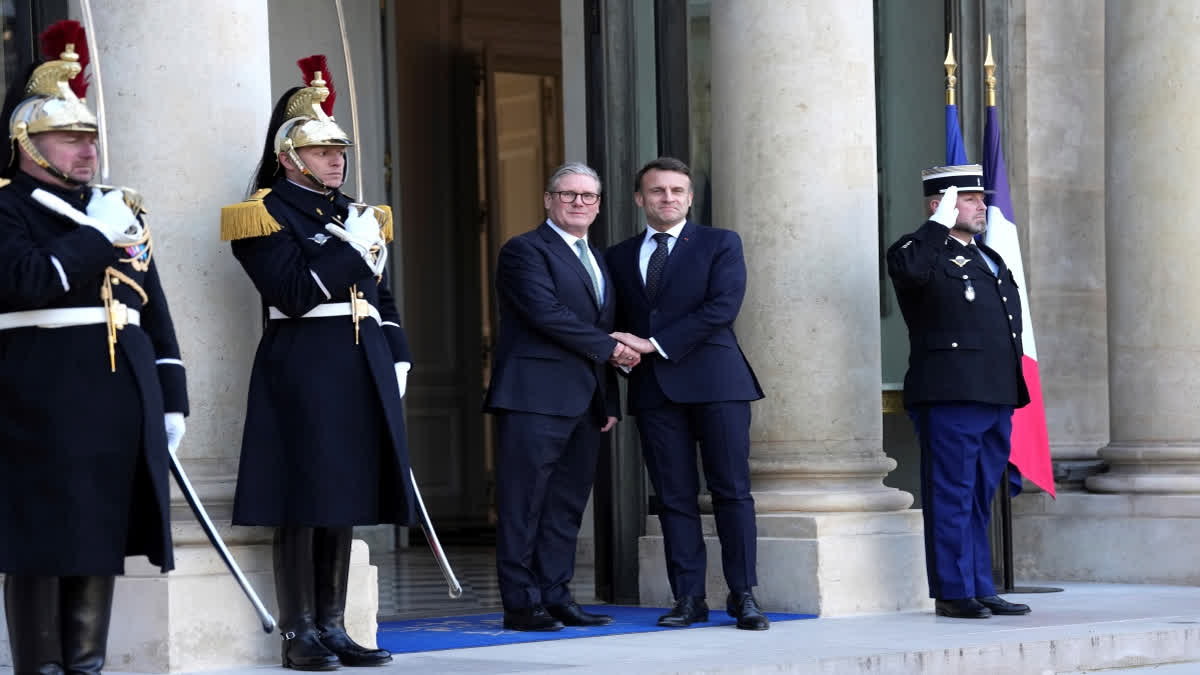Paris: European leaders gathered in Paris Monday for emergency talks on how to react to the U.S. diplomatic blitz on Ukraine, which has thrown a once-solid alliance into turmoil and left the Europeans questioning the reliability of their key transatlantic partner.
Shortly before the meeting, French President Emmanuel Macron spoke with U.S. President Donald Trump, but Macron's office would not disclose details about the 20-minute discussion.
Leaders of Germany, the United Kingdom, Italy, Poland, Spain, the Netherlands, Denmark and the European Union arrived at the Elysee Palace for talks on Europe's security quandary. NATO Secretary General Mark Rutte is also attending.
Last week, top U.S. officials from the Trump administration made their first visit to Europe, leaving the impression that Washington was ready to embrace the Kremlin while it cold-shouldered many of its age-old European allies.
Despite belligerent warnings for months ahead of Donald Trump's reelection as U.S. president, leaders hoped somehow that Trump would stand shoulder to shoulder with Europe in opposing Russia's war in Ukraine. Meanwhile, the continent would finally start to beef up its defenses and become less reliant on American firepower.
But a flurry of speeches by Vice President JD Vance and Defense Secretary Pete Hegseth last week questioned both Europe's security commitments and its fundamental democratic principles. Macron said their stinging rebukes and threats of non-cooperation in the face of military danger felt like a shock to the system.
The tipping point came when Trump decided to upend years of U.S. policy by holding talks with Russian President Vladimir Putin in hopes of ending the Russia-Ukraine war. Then, Trump's special envoy for Ukraine and Russia on Saturday all but ruled out the inclusion of other Europeans in any Ukraine peace talks.
Europe's 'existential moment'
German Foreign Minister Annalena Baerbock called the week "an existential moment ... where Europe has to stand up." That's where Macron hopes to step in with Monday's meeting.
Ever since World War II, the United States and Western European nations have basically moved in lockstep as they confronted the Soviet Union during the Cold War, right up to the increasingly aggressive actions of current-day Russia close to its borders. Even if there had long been U.S. complaints about the reluctance of many European NATO nations to step up their defense efforts, they never boiled up to the political surface as they have over the past days.
French officials said no firm announcements are expected, beyond a show of unity. More talks are expected at the broader EU level, they said.
Sending troops after a peace deal?
Ukraine's President Volodymyr Zelenskyy said "negotiations are moving fast with Europe," in a virtual news conference Monday in Kyiv, he said, "Everyone told me that what happened (at the Munich Security Conference) accelerated everything," Zelenskyy said Macron had agreed to provide him with a briefing on the conclusions from the meeting in Paris.
A strong U.S. component, though, will remain essential for the foreseeable future since it will take many years before European nations can ratchet up defense production and integrate it into an effective force.
That U.S. bond also applies to dealing with war in Ukraine, said U.K. Prime Minister Keir Starmer. "U.S. support will remain critical and a U.S. security guarantee is essential for a lasting peace, because only the U.S. can deter Putin from attacking again," Starmer wrote in Monday's Daily Telegraph.
While many EU nations are still mulling whether to contribute troops to a potential force in Ukraine after a peace deal, Starmer said that the U.K. was "ready and willing to contribute to security guarantees to Ukraine by putting our own troops on the ground if necessary.
"I do not say that lightly. I feel very deeply the responsibility that comes with potentially putting British servicemen and women in harm's way," he wrote. Macron last year refused to rule out sending Western troops into Ukraine if necessary.
German Chancellor Olaf Scholz said it was clear that there wouldn't be European troops in Ukraine while the war is ongoing. "The questions about the security architecture that then have to be discussed will be discussed when the time is right," he said on the sidelines of an election campaign event, German news agency dpa reported.
"A ceasefire must not lead to Russian rearmament, which is followed by new Russian attacks," warned Danish Prime Minister Mette Frederiksen ahead of the Paris meeting.
Boosting EU defense spending
European nations are bent on boosting Ukraine where they can, and EU nations see eye to eye when it comes to upping defense spending. However, even if there is a general consensus to move beyond the goal of spending 2% of gross domestic product on defense, it is hardly clear how to get to 3%.
Some EU nations insist on an agreement on joint borrowing for massive defense projects, while others say the nations that lag behind on spending should first reach 2%. That issue is also set to be discussed at the meeting.
Poland's Prime Minister Donald Tusk said he plans to urge other leaders to invest more in defense, ahead of his departure for the Paris meeting. Poland spends more than 4% of its GDP on defense, more than any other NATO member.
"If we want to decide about the future of Ukraine together with Ukraine, the United States, Russia, we must also show that we are capable of much more serious investment in our own defense," he said. However, he also said that he does not envision Poland sending its own troops to Ukraine.
Some EU nations' criticism
But some of the EU nations balked at the thought of the restrictive Elysee meeting with only a few chosen leaders while others were left in the cold. For an uncomfortable number of decisions, the EU needs the backing of all 27 nations. Hungarian Prime Minister Viktor Orbán, a staunch ally of Russian President Vladimir Putin, has already threatened to use his veto on a number of occasions.
Slovenian President Nataša Pirc Musar said the selective list of invitees was proof that the EU member states are not treated equally. "This is not Europe that commands respect abroad. This is not the Europe that would be a serious partner to the North American ally," she said.
Slovakia's populist Prime Minister Robert Fico questioned the presence of top EU representatives at the meeting, noting that the EU has no right to decide about any deployment of foreign troops in a country.



